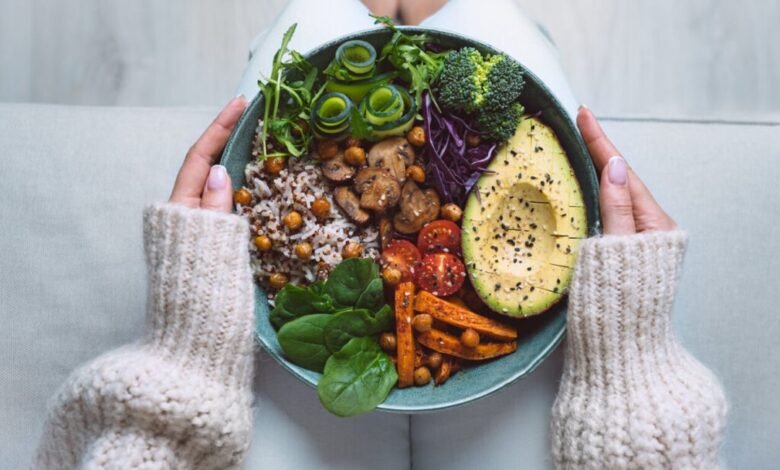The Rise of Plant-Based Diets: 10 Delicious Recipes for a Healthier Lifestyle

In recent years, the rise of plant-based diets has revolutionized the way we approach nutrition and lifestyle choices. With a growing awareness of the environmental impact of food production and an increasing emphasis on personal health and well-being, more individuals are turning to plant-based eating as a sustainable and nutritious alternative. Plant-based diets, centered around whole foods derived from plants, offer a plethora of health benefits while also promoting a more eco-conscious approach to food consumption.
Embracing a plant-based lifestyle goes beyond mere dietary preferences; it represents a commitment to fostering a healthier planet and a healthier self. By prioritizing fruits, vegetables, grains, legumes, nuts, and seeds over animal products, individuals can reduce their carbon footprint, support sustainable agriculture, and enjoy a diverse array of delicious and nutritious meals. As we delve into the world of plant-based eating, we uncover not only a wealth of culinary possibilities but also a pathway to better health and environmental stewardship.
The Rise of Plant-Based Diets
Plant-Based Diets
In recent years, there has been a significant surge in interest towards plant-based diets. This dietary approach involves consuming foods derived from plants while minimizing or eliminating animal products. The concept extends beyond just salads and vegetables, encompassing a diverse array of fruits, vegetables, grains, legumes, nuts, and seeds. Plant-based diets have gained traction due to their numerous health benefits, environmental sustainability, and ethical considerations.
Why Choose Plant-Based Diets?
The decision to adopt a plant-based diet stems from various reasons, including concerns about environmental impact, personal health goals, and ethical beliefs. By reducing reliance on animal agriculture, plant-based diets help lower greenhouse gas emissions, conserve water, and preserve natural habitats. Additionally, numerous studies have shown that plant-based diets can lower the risk of chronic diseases such as heart disease, diabetes, and certain cancers. Ethical considerations, such as animal welfare and sustainability, also play a significant role in driving individuals towards plant-based eating habits.
10 Delicious Plant-Based Recipes
Avocado Toast with Cherry Tomatoes and Basil
Ingredients: ripe avocado, cherry tomatoes, fresh basil leaves, whole grain bread
Instructions: Mash avocado onto toasted bread, top with sliced cherry tomatoes and basil leaves.
Quinoa Salad with Roasted Vegetables
Ingredients: quinoa, mixed vegetables (bell peppers, zucchini, carrots), olive oil, lemon juice, fresh herbs
Instructions: Cook quinoa according to package instructions, roast vegetables in olive oil, mix with quinoa, and dress with lemon juice and herbs.
Vegan Chickpea Curry
Ingredients: chickpeas, coconut milk, curry paste, onion, garlic, ginger, vegetables (such as spinach or cauliflower)
Instructions: Sauté onion, garlic, and ginger, add curry paste and coconut milk, simmer with chickpeas and vegetables until tender.
Mushroom and Spinach Stuffed Portobello Mushrooms
Ingredients: portobello mushrooms, mushrooms, spinach, garlic, breadcrumbs, vegan cheese
Instructions: Remove stems from portobello mushrooms, sauté mushroom filling, stuff into mushroom caps, top with breadcrumbs and vegan cheese, bake until golden.
Sweet Potato and Black Bean Tacos
Ingredients: sweet potatoes, black beans, taco seasoning, corn tortillas, avocado, salsa
Instructions: Roast sweet potatoes, mix with black beans and taco seasoning, serve in warmed tortillas with avocado and salsa.
Vegan Lentil Soup
Ingredients: lentils, vegetables (carrots, celery, onion), vegetable broth, diced tomatoes, garlic, herbs
Instructions: Sauté vegetables, add lentils, broth, and tomatoes, simmer until lentils are tender, season with herbs.
Zucchini Noodles with Pesto
Ingredients: zucchini, basil pesto, cherry tomatoes, pine nuts
Instructions: Spiralize zucchini into noodles, toss with pesto, top with halved cherry tomatoes and pine nuts.
Coconut Chickpea Curry
Ingredients: chickpeas, coconut milk, curry powder, onion, garlic, ginger, vegetables (such as bell peppers and peas)
Instructions: Sauté onion, garlic, and ginger, add curry powder and coconut milk, simmer with chickpeas and vegetables until cooked through.
Vegan Buddha Bowl
Ingredients: quinoa, roasted vegetables (such as sweet potatoes, broccoli, and Brussels sprouts), avocado, hummus, tahini dressing
Instructions: Arrange cooked quinoa, roasted vegetables, avocado slices, and hummus in a bowl, drizzle with tahini dressing.
Chocolate Avocado Mousse
Ingredients: ripe avocado, cocoa powder, maple syrup, vanilla extract
Instructions: Blend avocado, cocoa powder, maple syrup, and vanilla extract until smooth, chill before serving.
Read More: The Role of Connected Wearable Devices in Healthcare
Conclusion
The rise of plant-based diets marks a significant shift in our approach to food consumption, health, and sustainability. With an increasing awareness of the interconnectedness between our dietary choices and their impact on the planet, more people are opting for plant-centric meals as a means to promote both personal well-being and environmental conservation. By incorporating a variety of delicious and nutritious plant-based recipes into our daily lives, we not only nourish our bodies with wholesome ingredients but also contribute to the greater good of our planet.
As we journey towards a future defined by mindful eating and conscious living, embracing plant-based diets offers a gateway to a healthier, more sustainable lifestyle. Through simple yet flavorful plant-based recipes, we have the power to transform our health, reduce our environmental footprint, and inspire others to join us on this journey towards a greener, more compassionate world. Let us continue to explore the diverse flavors and benefits of plant-based eating, knowing that each plant-based meal we enjoy is a step towards a brighter, more sustainable future for generations to come.
FAQs
Are plant-based diets suitable for everyone?
Plant-based diets can be suitable for individuals of all ages, provided they are well-planned to meet nutritional needs.
How can I ensure I’m getting enough protein on a plant-based diet?
Protein sources such as beans, lentils, tofu, tempeh, nuts, and seeds can easily meet your protein requirements on a plant-based diet.
What are some common nutrient deficiencies to watch out for on a plant-based diet?
Vitamin B12, iron, calcium, and omega-3 fatty acids are nutrients that vegetarians and vegans should pay attention to and consider supplementing if necessary.
Will I miss meat if I switch to a plant-based diet?
While individual preferences vary, many people find that they can satisfy their cravings with flavorful and satisfying plant-based meals.
How can I deal with skepticism from friends and family about my decision to adopt a plant-based diet?











